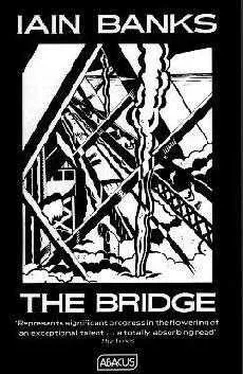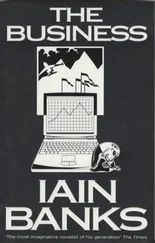The train rolled hesitantly forward towards another bank of thick mist. I was making beds in one of the sleeping cars. When the first small rocks started to roll down the mountainside I left that side of the carriage and watched through an open door as larger and larger boulders came crashing down the mist-shrouded slope into the train, bouncing up to break through windows or battering against the carriage sides. One vast boulder headed straight towards me; I ran down the corridor. The air was full of crashes and thuds and the sound of distant, confused, undirected gunfire. I felt the train shake, then a tremendous bang obliterated every other noise; the lava vaporising the lake, the gunfire, the small rocks whacking onto the sides and roof. The entire carriage flicked to one side, dashing me against the window and then over on my back as the car lights flickered and went out, a breaking, smashing sound seemed to come from all directions at once, and the buckling carriage roof and walls batted me between them like a ball.
Later, I discovered that the carriage had broken free from the rest of the stricken train and rolled down the slope of scree towards the boiling waters of the lake. The Field Marshal's men, looting and murdering their way through the cars, came upon me, mumbling to myself in the wreckage and - so they tell me, though they'd say anything-attempting to put the chief steward's head back onto what was left of his shoulders. I had stuck an apple in his mouth.
Language saved me again. The men speak the same tongue as I do; they took me to the Field Marshal. He was in a small train just up the line.
The Field Marshal is very tall and heavy, with long, disproportionate legs and a huge backside. He has a broad, round face and lank hair, dyed black. He favours garish uniforms with a very high albedo. He was sitting at a desk in his carriage, listening to music on the radio and eating crystallised quinces from a small plate when I was ushered before him, still half unconscious. He asked me where I came from; I vaguely recall telling him the truth, which he found extremely funny. You'll be my valet, he told me. I like a good story at dinner. I was locked in a small cell in one of the carriages while the Field Marshal's men completed their looting and killing. When I was searched, my handkerchief was taken from me. I saw the Field Marshal blowing his nose on it, some days later.
I watched the blood-splashed irregulars of the Field Marshal's force come back from my old train, carrying weapons and valuables; a wind came up and stirred the steam in the valley's cauldron. The lake was almost dry; lava flow and glacier finally met in a series of tremendous explosions which sent chunks of ice and rock hundreds of feet into the air. Our small train escaped, clanking and clattering, away from the wreck on the track behind us, and the elemental cataclysm beyond.
The Field Marshal's train was shorter and less well equipped than the one his men had ambushed. We moved only at night unless there was heavy cloud cover, hiding in tunnels during the day or covering the train with camouflage netting. For the first few days there was an air of tension in the train, but despite a narrow escape from a strafing fighter-bomber, and a hair-raising traverse of a great curved viaduct which was already damaged and under continuing heavy-artillery attack, the atmosphere amongst the motley-uniformed rabble perceptively lightened as we moved away from the scene of the ambush.
The volcanic activity also decreased; now there were only fumeroles and geysers and small lakes of boiling mud to betray the depths of fire beneath these freezing lands.
It was the Field Marshal's conceit to house the dozen or so pigs he possessed in fine state carriages, while quartering his human captives in a couple of muck-filled cattle trucks at the rear of the train. The pigs were bathed every week in the Field Marshal's own whirlpool bath, which took up a large part of his own carriage. Two soldiers were on permanent pig-husbanding detail, employed to keep clean the nest of sheets and blankets which the animals made of their beds, bring them their meals - they ate the same food as the rest of us - and generally look after their welfare.
Throwing captured soldiers into pools of boiling mud was a comparatively common occurrence, and done just for sport. The Field Marshal could tell I found these practices distressing. 'Ore,' he would say (tjiis was how he pronounced my name), 'Ore, don't you like our little games?' I would smile, dissemble.
The days grew lighter, dormant volcanoes gave way to low hills and savannah. Deprived of his boiling mud, the Field Marshal devised a new sport; he tied a short rope to a man's neck and made him run in front of the train. The Field Marshal took the controls, giggling as he opened the throttle and chased his quarry. They usually lasted a half mile or so before they tripped and fell across the sleepers, or tried to jump to one side, in which case the Field Marshal just opened the throttle and dragged them along the edge of the track.
At the last pool of boiling mud, he had a rope put round the victim, and once he was cooked, dragged him out, covered in a baked layer of mud; he had his men shovel more mud over the twisted figure, then when it had dried left the resulting gnarled statue standing on the ash shore of a salty, foul-smelling inland sea.
We were crossing the floor of a drained sea, towards a city set on a great circular cliff, when the bombers appeared. The train increased speed, heading for a tunnel set underneath the ruined city; the train's few anti-aircraft guns were manned.
Three medium bombers flew straight up the track towards us, not a hundred feet above the rails. They started dropping their bombs, trailing plane first, when they were quarter of a mile away. I was watching from the protruding perspex roof of the Field Marshal's observation car, where I'd been opening a bottle of eiswein . The driver braked, throwing us forward. The Field Marshal pushed past me, kicked open an emergency exit and threw himself out. I followed him, thudding into the side of a dusty embankment as the line of bombs stamped down the carriages like a soldier's boots on a train set. The embankment bounced like a trampoline; stones and fragments of train showered from the sky. I lay curled up, fingers in my ears.
We are in the abandoned city now, the Field Marshal, myself and another ten men; all that survived. Some weapons we have, and one pig. The ruined city is full of echoing, flag hung halls and tall stone spires; we camp in a library because it is the only place we can find anything which will burn. The city is built of stone, or a dark, heavy wood which refuses to do more than glow dull red, even if ignited with powder extracted from rifle cartridges. We get our water from a rusty cistern on the roof of the library, and catch and eat some of the city's pale-skinned nocturnal animals, who flit like ghosts through the ruins, looking for something they never seem to find. The men complain that these shy but gullible creatures make for poor hunting. We finish our meal. The men pick at their teeth with bayonets; one of them goes to a book-lined wall and knocks down some ancient tomes from this productive face. He brings them back to the fire, twisting their spines and ruffling their pages so that they'll burn better.
I tell the Field Marshal about the barbarian and the enchanted tower, the familiar and the wizard and the witch queen and the mutilated women; he likes that one.
Later, the Field Marshal retires with two of his men and his last pig to his private room. I clean the dishes and listen to the men complain about the monotonous diet and dull sport. They might mutiny soon; the Field Marshal has had no good ideas about what to do next.
I am called in to the Field Marshal's quarters; an old study, I believe. It contains many tables, and one bed. The two men leave, grinning at me. They close the door. Put this on, the Field Marshal says, smiling.
Читать дальше












